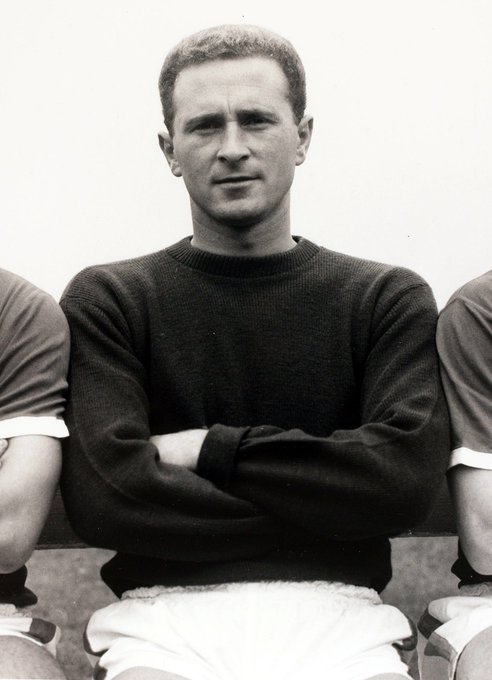Share the post "Harry Gregg: Munich air disaster hero and Northern Ireland goalkeeping great dies"
Former Manchester United and Northern Ireland goalkeeper Harry Gregg, hailed as a hero of the 1958 Munich air disaster, has died at the age of 87.
Gregg bravely rescued team-mates and other passengers following the plane crash in which 23 were killed.
When he joined United in December 1957 for £23,500 he was the world’s most expensive goalkeeper and was voted the best at the following year’s World Cup.
He made 25 appearances for Northern Ireland between 1954 and 1963.
The former goalkeeper’s charitable Harry Gregg Foundation said that the goalkeeping great died in Causeway Hospital in Coleraine.
“Harry passed away peacefully in hospital surrounded by his loving family.
“The Gregg family would like to thank the medical staff at Causeway Hospital for their wonderful dedication to Harry over his last few weeks.
“To everyone who has called, visited or sent well wishes we thank you for the love and respect shown to Harry and the family.
“Details of his funeral arrangement will be issued in the next few days. We would ask that the privacy of the family is respected at this difficult time.
“Never to be forgotten!”
United learn of death with ‘deepest sadness’

It is with deepest sadness that we have learned of the passing of former player Harry Gregg OBE. The thoughts and prayers of everyone at the club go out to Harry’s family and friends.

12.3K7:35 PM – Feb 16, 2020Twitter Ads info and privacy2,838 people are talking about thisReport
Less than three months after making his Old Trafford debut, Gregg and his team-mates were travelling back from a European Cup tie in Belgrade on 6 February when their plane crashed after they stopped to re-fuel in Munich.
The crash’s death toll included eight Manchester United players.
Gregg would become known as the ‘hero of Munich’ for his actions following the crash, where he rescued a number of survivors including a young baby and team-mates Bobby Charlton and Jackie Blanchflower from the wreckage.
Two weeks after pulling several team-mates from the wreckage of the Munich Air Disaster, Gregg kept a clean sheet as Manchester United put Sheffield Wednesday out of the FA Cup.

The goalkeeper was determined that the tragic event would not define his career, or indeed his life.
“I would be telling lies if I said that I thought about it all the time. In fact I would go insane,” he said in 2018 before a service marking 60 years since the disaster.
“I know the media would like to talk about what happened on a runway. I don’t blame people for that but if all I was ever part of, or all I ever achieved was to do with what happened in Germany, in Munich, if that was what my life was all about, it didn’t come to very much.”
Indeed, the career that followed would cement Gregg’s legacy as one of the finest goalkeepers in Manchester United and Northern Ireland history.
A life in professional football saw Gregg, who Sir Alex Ferguson described as his hero, spend 35 years in England and Wales.
After his return home to Northern Ireland, he opened a hotel in Portstewart and in 2015 launched a charitable foundation aimed at encouraging young people’s participation in football and other health, lifestyle, educational, heritage and social inclusion activities.
He made his final trip to Old Trafford in 2018, before being named OBE in the Queen’s 2019 New Year’s Honours.
Northern Ireland’s football governing body, the Irish Football Association called Gregg a “legend of the game and a brave, selfless giant of a man”.
BBC